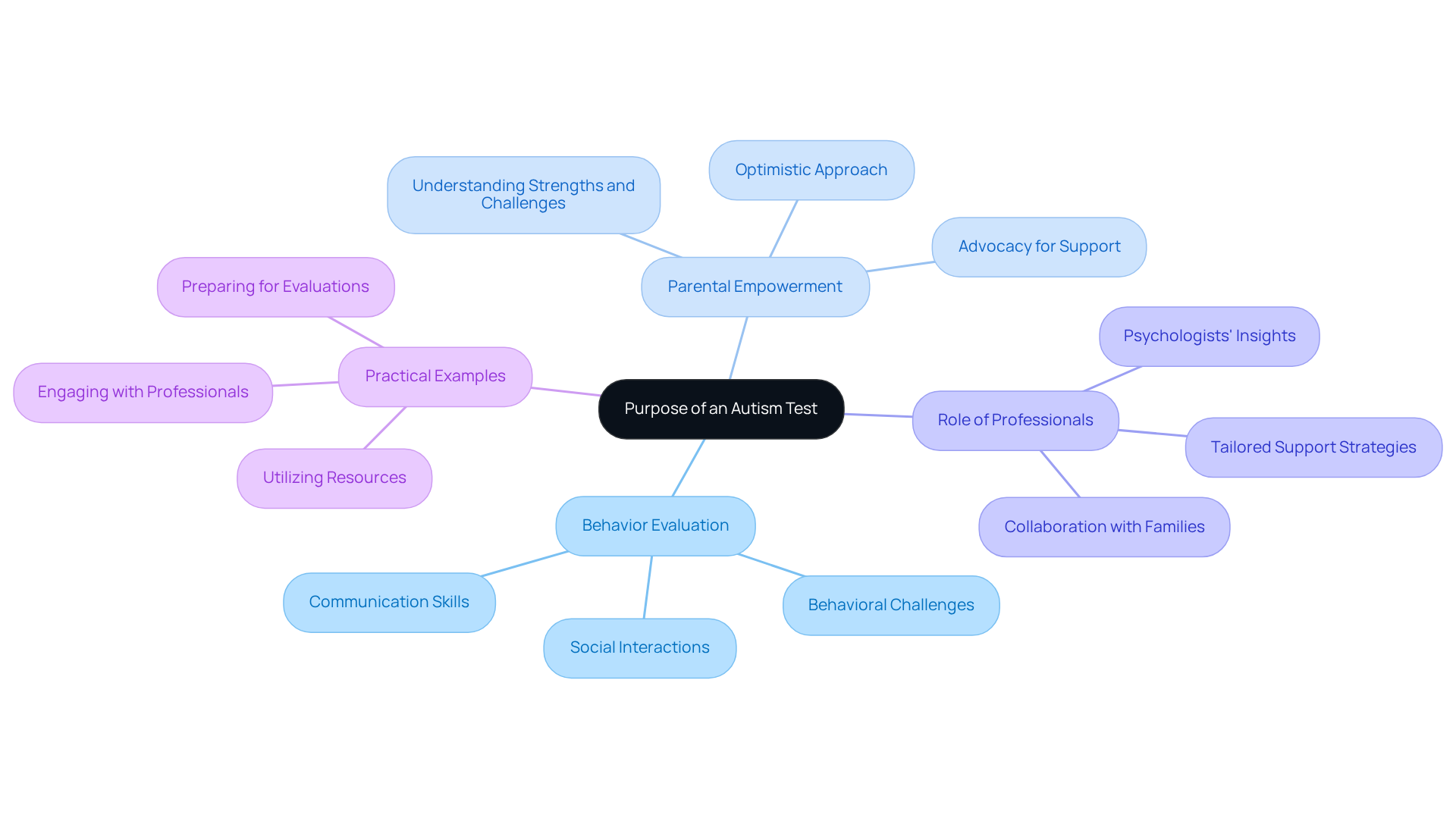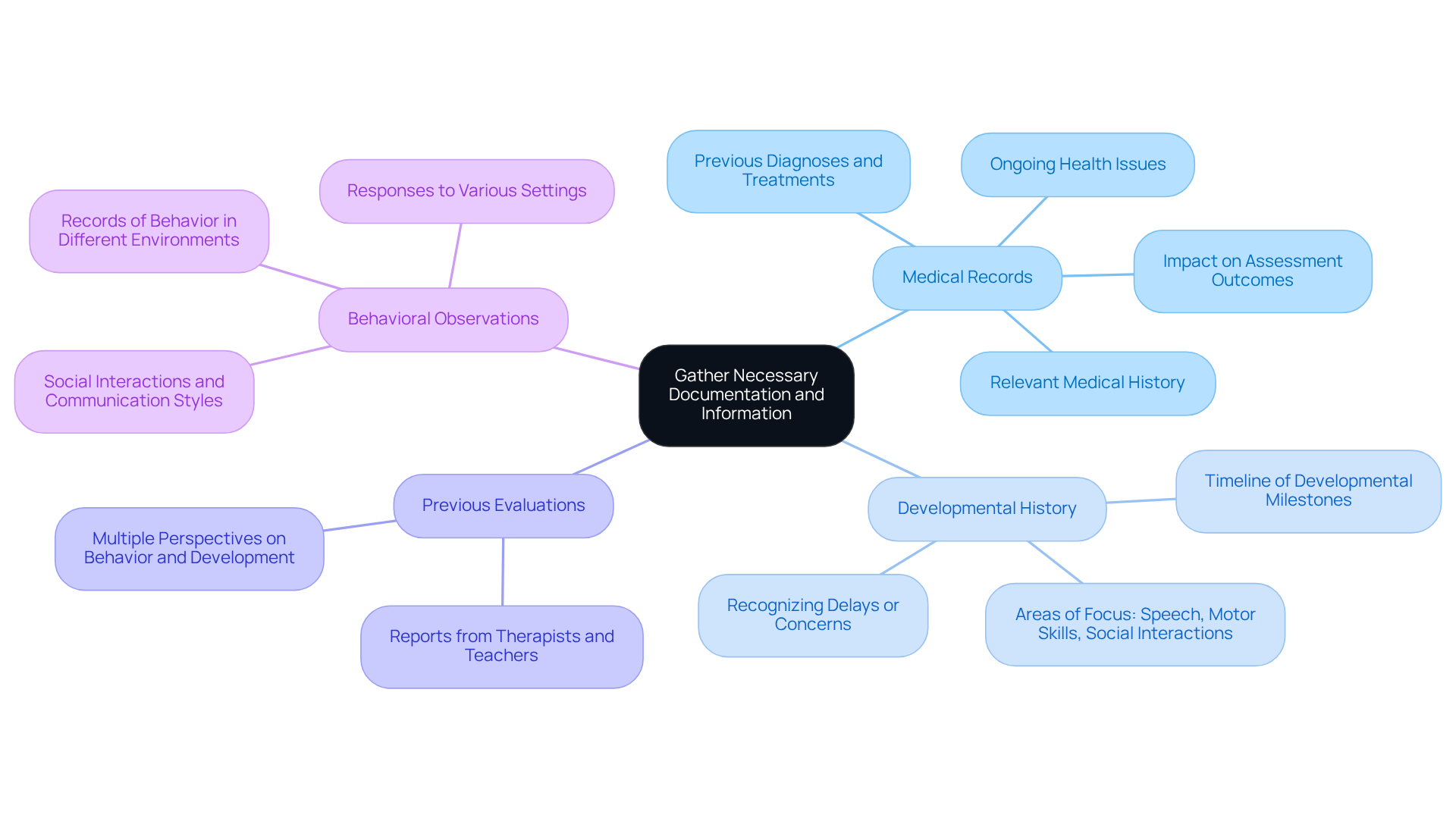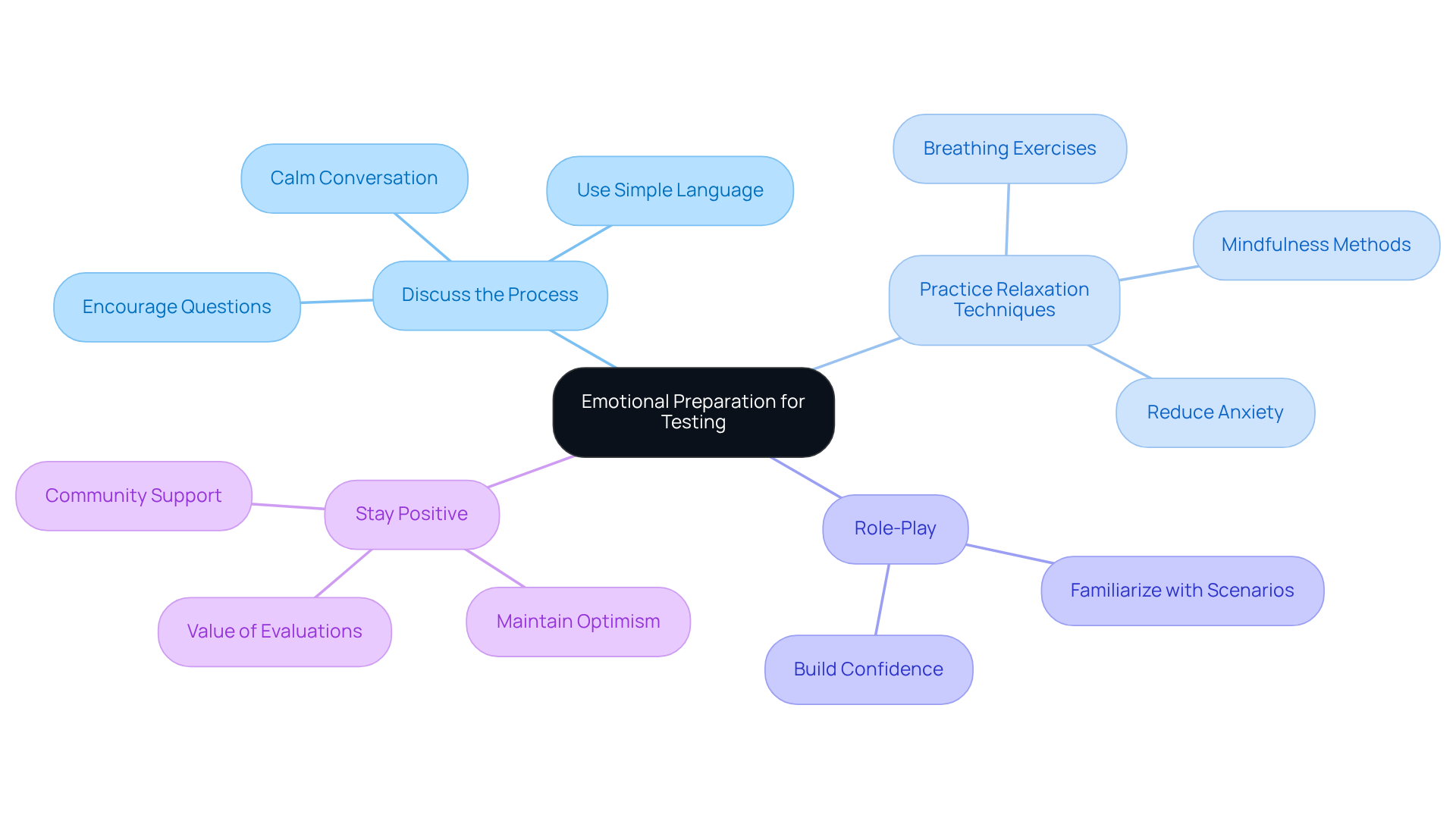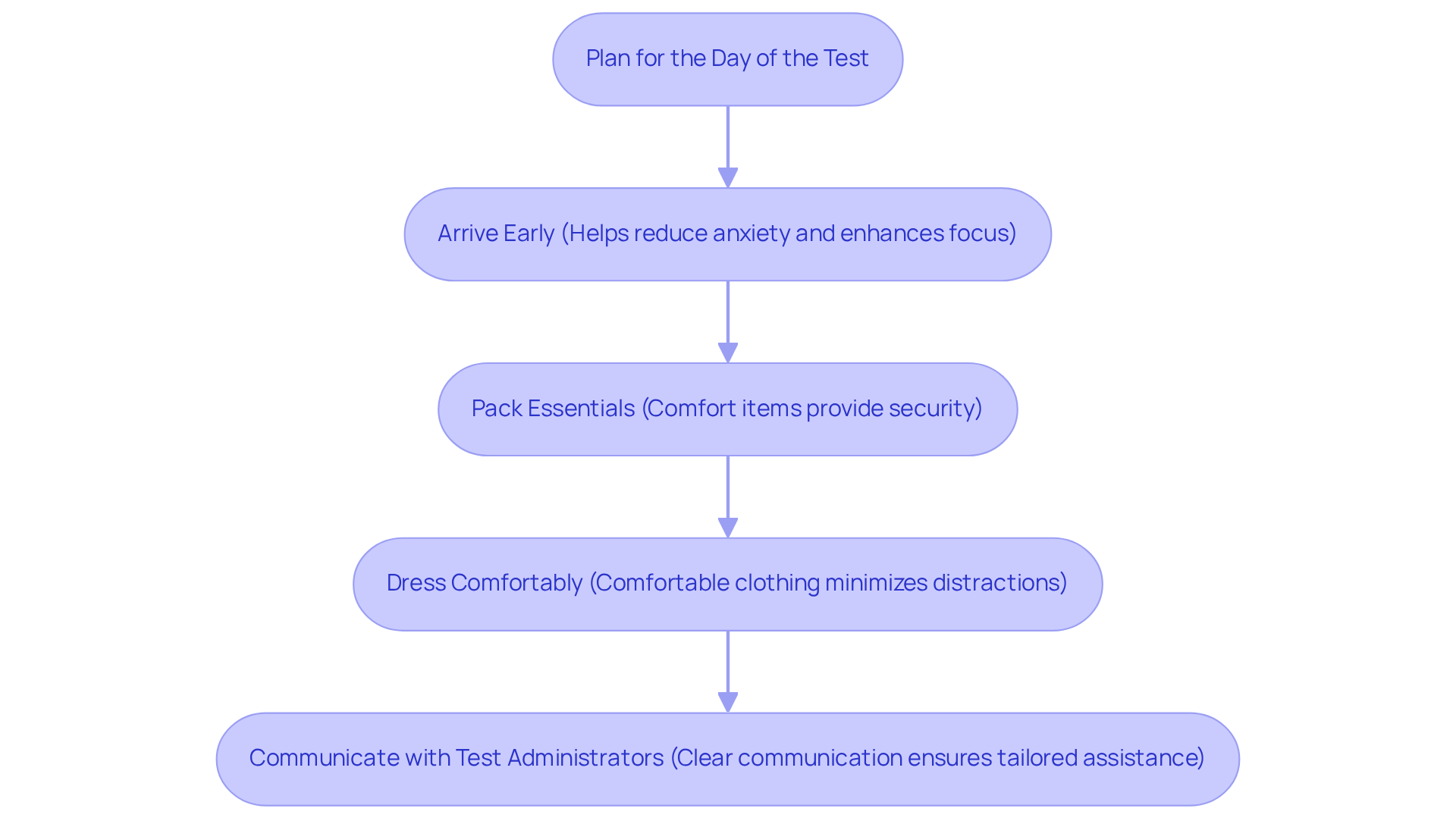Overview
Preparing for an autistic test can feel overwhelming for parents, but understanding the essential steps can make a significant difference. First, it’s crucial to grasp the purpose of the test. Knowing why it’s being conducted can alleviate some anxiety and help you approach the process with clarity and confidence.
Next, gather all necessary documentation. Having everything in order not only aids in the testing process but also shows your child that you are organized and supportive. This preparation can create a sense of security for both you and your child.
Emotional preparation is equally important. Acknowledge your feelings and those of your child; it’s natural to feel apprehensive. Engaging in conversations about the test can help demystify the experience and foster a sense of teamwork.
Finally, plan for the day of the test. Consider logistics such as travel time and what to bring. A well-thought-out plan can ease stress and help your child feel more comfortable. Remember, thorough preparation and support can significantly enhance the testing experience and outcomes for children undergoing evaluation for autism spectrum disorder. You are not alone in this journey; seek support and share your experiences with others who understand.
Introduction
Navigating the path to an autism diagnosis can be a daunting journey for families, filled with uncertainty and countless questions. Understanding the purpose of an autism test is essential. It not only assesses a child's behavior and communication skills but also lays the groundwork for future support and interventions. However, the stakes can feel high. How can parents ensure they are fully prepared to advocate for their child's unique needs? This guide outlines four crucial steps to help families approach the testing process with confidence and clarity, transforming anxiety into empowerment.
Understand the Purpose of an Autism Test
Before embarking on the testing journey, it's crucial to grasp the purpose of a developmental assessment. These assessments aim to evaluate a young person's behavior, communication skills, and social interactions, helping to determine if they meet the criteria for an autistic test for an autism spectrum disorder (ASD) diagnosis. Recognizing that the test seeks to identify both strengths and challenges can empower guardians to approach the process with optimism. Moreover, understanding that the results will inform future interventions and support strategies is essential. This knowledge equips parents to advocate effectively for their children and prepares them for the next steps in the process.
As the CDC highlights, approximately 1 in 36 youngsters are diagnosed with developmental disorders, underscoring the importance of timely and accurate evaluations. Psychologists emphasize that a thorough understanding of the autistic test evaluations is vital for maximizing their benefits and tailoring support to each child's unique needs. One psychologist noted, 'Comprehending the evaluation process enables guardians to more effectively assist their child's growth and utilize available resources.'
Practical examples, such as parents collaborating with professionals to prepare for evaluations, illustrate the proactive steps families can take. Additionally, the DSM-V's merging of classifications for this condition reflects the evolving understanding of autism, emphasizing the need to stay informed about current evaluation standards. By engaging with this process, parents can foster a supportive environment that nurtures their child's development.

Gather Necessary Documentation and Information
To effectively prepare for an evaluation, parents are encouraged to thoughtfully collect and organize crucial paperwork and details. This preparation is vital in ensuring that evaluators have a comprehensive view of the child's needs. Here are some key areas to focus on:
- Medical Records: It’s important to compile relevant medical history, including previous diagnoses, treatments, and ongoing health issues. This information is essential as it offers evaluators a thorough perspective of the individual's health background. Experts emphasize that a detailed medical history can significantly impact assessment outcomes, with studies indicating that comprehensive records correlate with higher satisfaction scores in autism families.
- Developmental History: Creating a detailed timeline of the individual's developmental milestones can provide invaluable insights. Covering areas such as speech, motor skills, and social interactions, this history aids evaluators in understanding the young person's growth trajectory, helping to recognize any delays or concerns. As Temple Grandin highlights, understanding a young person's developmental journey is crucial for accurate diagnosis.
- Previous Evaluations: Gathering past assessments or reports from therapists, teachers, or other professionals who have worked with the individual can offer valuable perspectives. These documents can shed light on the young one's behavior and development from multiple angles. Stephen Shore wisely notes, 'If you’ve met one person with autism, you’ve met one person with autism,' underscoring the importance of diverse evaluations.
- Behavioral Observations: Keeping records of the young person's behavior across different environments, such as home and school, is also beneficial. Observations regarding social interactions, communication styles, and responses to various settings can greatly influence the evaluation process.
By organizing this information, parents not only streamline the autistic test process but also provide evaluators with a holistic understanding of the child's unique needs. Specialists point out that a comprehensive medical and developmental background is essential in evaluations concerning developmental disorders, as it lays the groundwork for precise diagnosis and effective intervention strategies. Additionally, parents should consider how to present this documentation during the assessment, ensuring a thorough evaluation for their child.

Prepare Emotionally for the Testing Experience
Preparing emotionally for the autistic test experience is crucial for individuals with autism. It's important to equip your child with effective strategies to help them cope with test anxiety, particularly in preparation for the autistic test, ensuring they feel supported and understood.
- Discuss the Process: Engage your child in a calm conversation about what to expect during the test. Use simple language to explain the steps involved, and encourage them to ask questions. Address any concerns they may have, fostering an open dialogue that reassures them.
- Practice Relaxation Techniques: Introduce your child to simple breathing exercises or mindfulness methods. Research indicates that these relaxation techniques can significantly lower anxiety levels in children with autism, thereby enhancing their ability to concentrate during the autistic test. For instance, children who practice relaxation techniques often experience a notable decrease in anxiety, which can lead to improved performance during the autistic test.
- Role-Play: If suitable, role-play potential scenarios they might encounter during the test. This familiarization can help alleviate fears and build confidence, making the environment feel more predictable and manageable.
- Stay Positive: Maintain an optimistic outlook about the testing process. Emphasize that evaluations, such as the autistic test, are valuable tools for understanding their unique needs, which can lead to better support and resources. As Kerry Magro wisely states, 'Autism is not a tragedy. Ignorance is a tragedy,' reminding us that understanding and preparation can make a significant difference.
By emotionally preparing your child, you can encourage a sense of comfort and confidence, ultimately leading to a more accurate evaluation outcome. Remember, you are not alone in this journey; the community at ASD Media is here to support you.

Plan for the Day of the Test
On the day of the evaluation, careful preparation can profoundly impact your child's performance. It's essential to consider the following steps to create a supportive atmosphere:
- Arrive Early: Arriving at the testing location ahead of time allows your child to acclimate to the new environment, reducing anxiety and enhancing focus. Studies show that early arrivals can positively affect children's performance in evaluations, as it gives them the chance to explore the area and feel more at ease. With approximately 1 in 36 individuals in the U.S. diagnosed with autism spectrum disorder as of 2023, the significance of proper preparation for an autistic test cannot be overstated.
- Pack Essentials: Bring along necessary items such as snacks, comfort items (like a favorite toy or blanket), and any required documentation. Familiar items can help alleviate your child's nerves and foster a sense of security.
- Dress Comfortably: Ensure your little one is dressed in comfortable clothing. This can help them feel at ease and less distracted during the evaluation, allowing them to concentrate better on the tasks at hand.
- Communicate with Test Administrators: Upon arrival, take the time to discuss any specific needs or concerns with the testing team. Clear communication ensures that they can provide the best assistance tailored to your child's unique needs. As one teacher remarked, "Fostering a nurturing environment can greatly improve a young person's performance during evaluations."
By planning ahead and creating a supportive atmosphere, you can significantly enhance your child's experience and performance during the assessment.

Conclusion
Preparing for an autism test is a crucial step in ensuring a smooth and effective evaluation process. By understanding the significance of the assessment and taking proactive measures, parents can cultivate a supportive environment that enhances the chances for an accurate diagnosis and personalized interventions. It's important to recognize that these evaluations not only identify challenges but also illuminate strengths, empowering families to approach the process with positivity and determination.
This article outlines four essential steps to prepare for an autism test:
- Understanding the purpose of the evaluation
- Gathering necessary documentation
- Emotionally preparing both the child and themselves
- Planning for the day of the test
Each of these steps is vital in enhancing the overall experience and outcome of the assessment. By collecting comprehensive medical and developmental histories, engaging in open conversations about the testing process, practicing relaxation techniques, and ensuring a comfortable atmosphere on test day, parents can significantly influence their child’s performance.
Ultimately, the journey toward an autism diagnosis transcends the test itself; it is about fostering understanding, support, and advocacy. Embracing this process with preparation and care can lead to valuable insights and resources that pave the way for a child's growth and development. It is essential for parents and guardians to remain proactive, informed, and engaged, as these efforts can profoundly impact their child's future and well-being.
Frequently Asked Questions
What is the purpose of an autism test?
The purpose of an autism test is to evaluate a young person's behavior, communication skills, and social interactions to determine if they meet the criteria for an autism spectrum disorder (ASD) diagnosis.
Why is it important to understand the testing process?
Understanding the testing process is important because it helps guardians approach the evaluation with optimism, recognize the strengths and challenges identified, and prepare for future interventions and support strategies.
What do the results of an autism test inform?
The results of an autism test inform future interventions and support strategies, allowing parents to advocate effectively for their children.
How prevalent are developmental disorders in children?
According to the CDC, approximately 1 in 36 youngsters are diagnosed with developmental disorders, highlighting the importance of timely and accurate evaluations.
What role do psychologists play in the autism testing process?
Psychologists emphasize the importance of understanding the evaluation process to maximize its benefits and tailor support to each child's unique needs.
Can parents take proactive steps to prepare for evaluations?
Yes, parents can collaborate with professionals to prepare for evaluations, which illustrates proactive involvement in the testing process.
How has the classification of autism evolved?
The DSM-V has merged classifications for autism, reflecting an evolving understanding of the condition and underscoring the need to stay informed about current evaluation standards.




